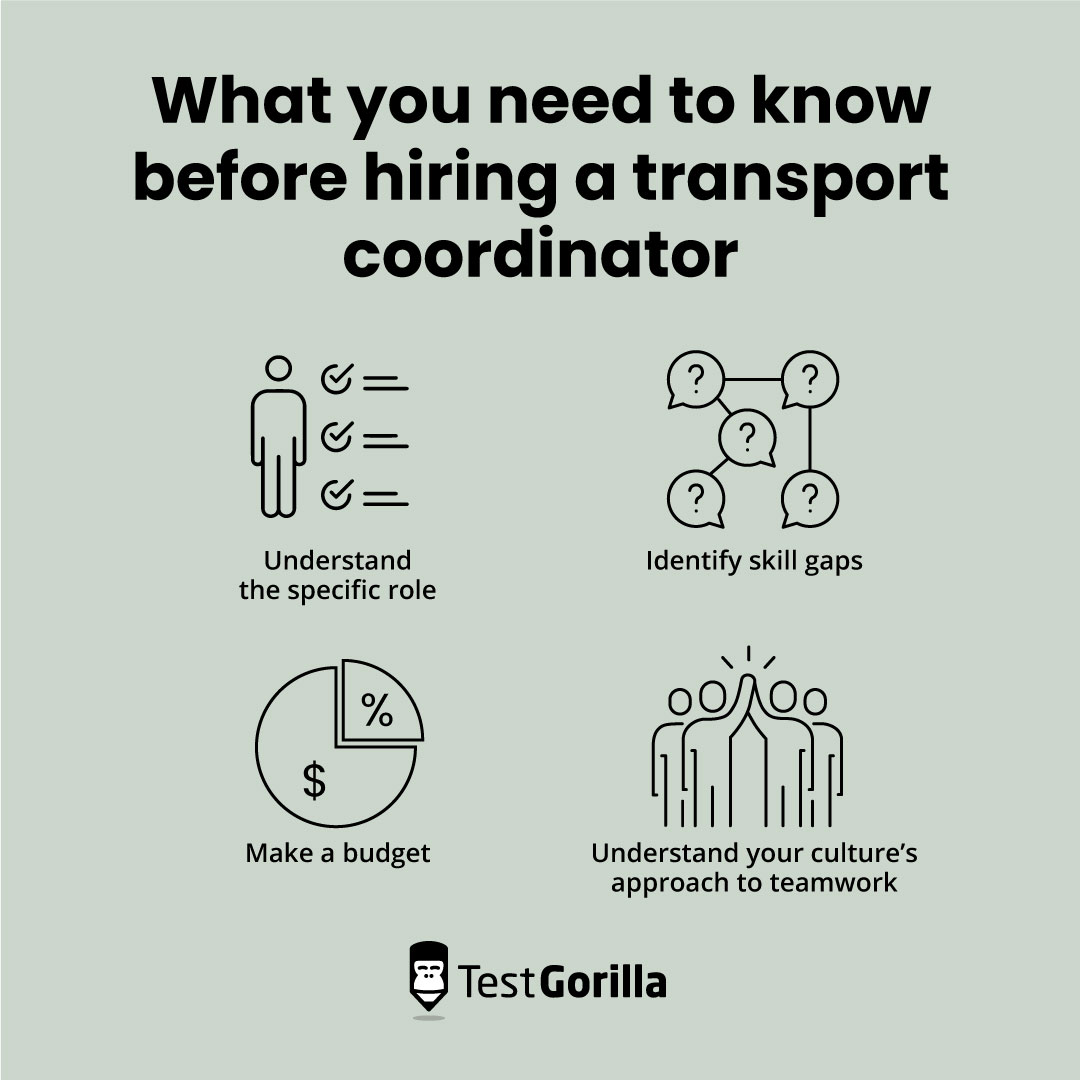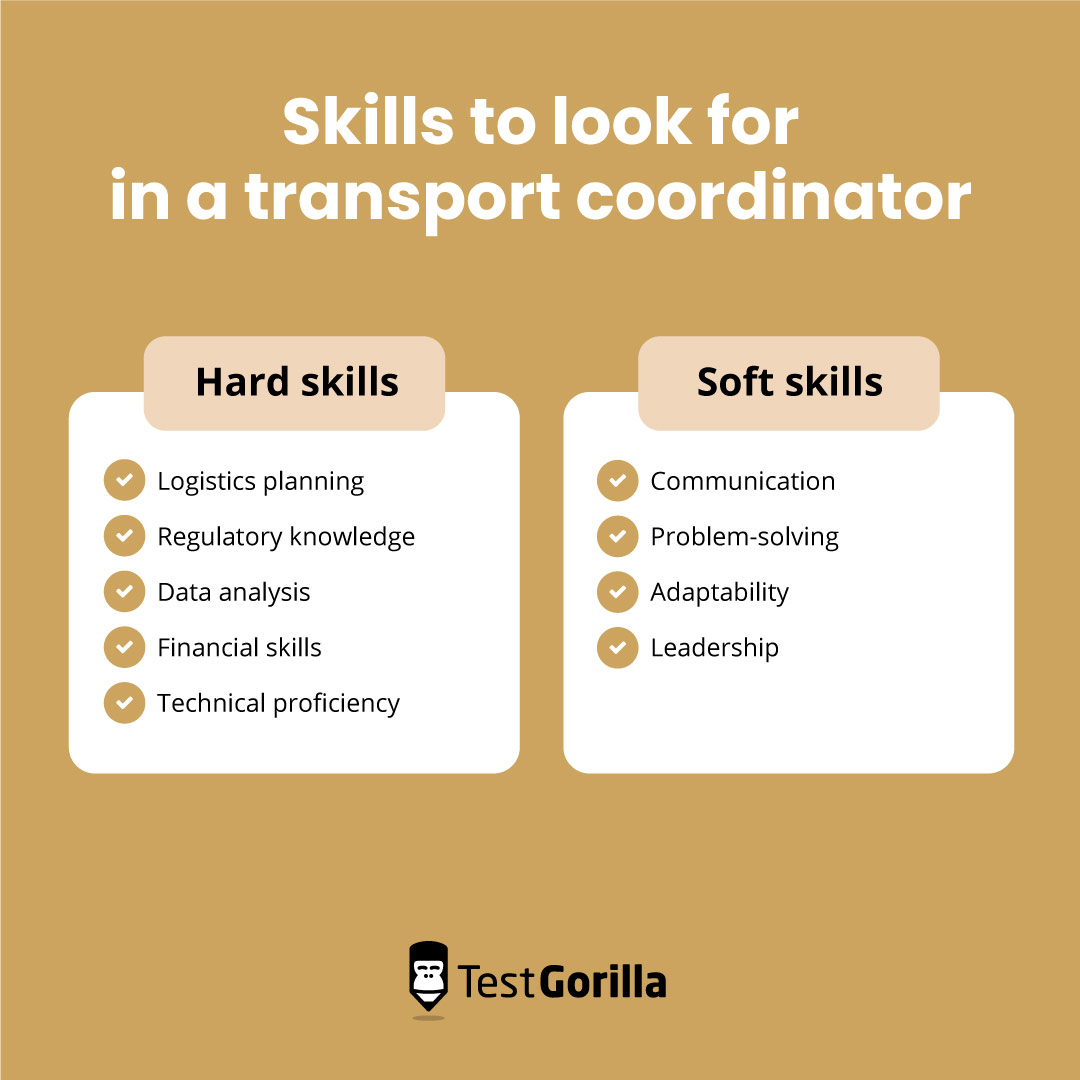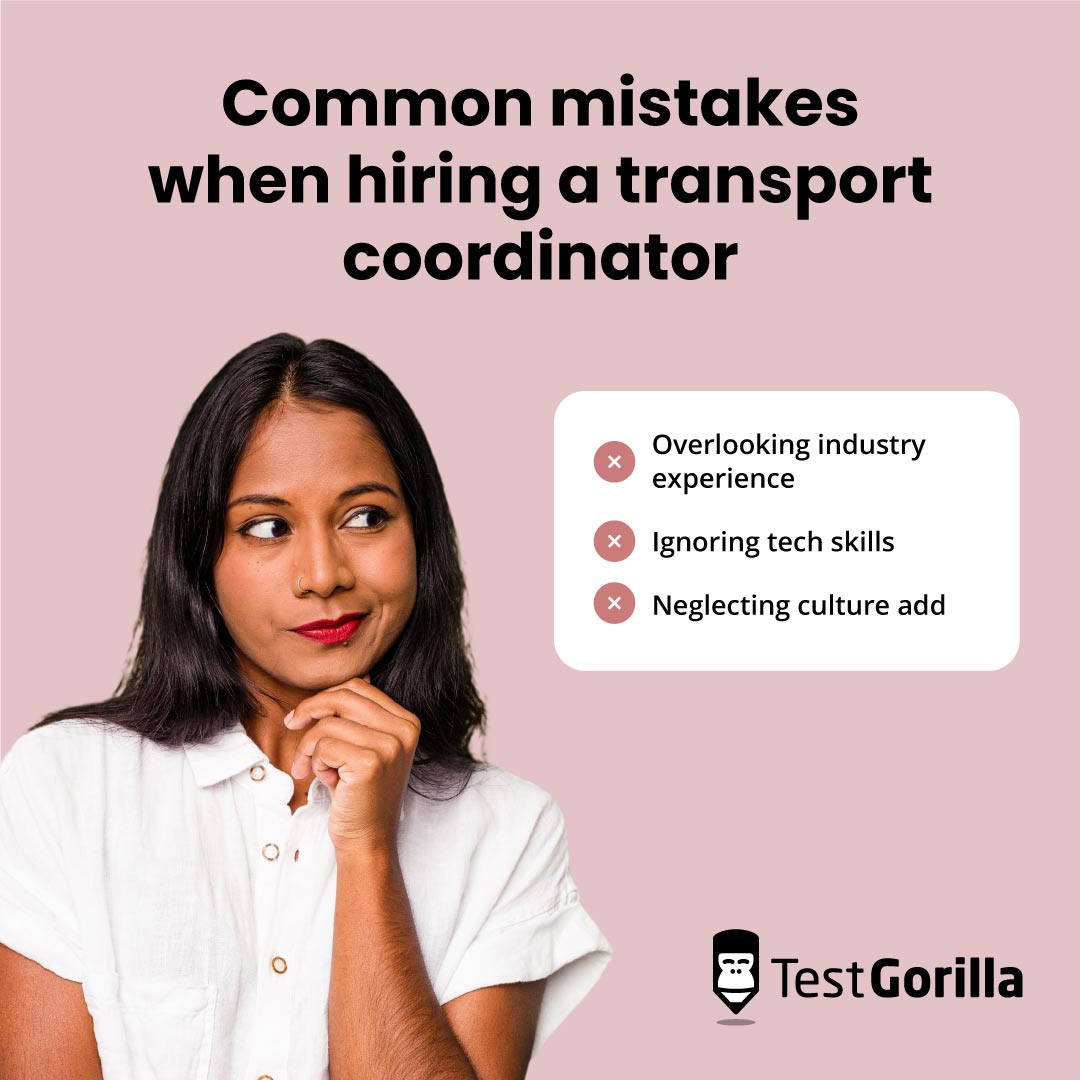Effective transport coordinators are crucial for managing and streamlining your company's logistics, ensuring timely deliveries, and optimizing supply chain operations.
Yet bringing on the wrong person for the job can lead to logistical nightmares. They might mismanage shipping schedules, increase transportation costs, and negatively impact your company's efficiency and customer relations.
This problem isn’t uncommon, as many organizations struggle to find and attract the right talent for these specialized roles. But you don't have to fall into this trap.
Below, we'll show you how to attract and hire the top transport coordinators.
You'll discover the essential skills and qualities that make a successful coordinator, how to assess logistics professionals, and where to find the best candidates. Plus, we'll highlight some key mistakes to avoid, ensuring your logistics and supply chain are in the best hands.
Table of contents
- What you need to know before hiring a transport coordinator
- Skills and qualifications to look for in a transport coordinator
- Where to find skilled transport coordinators
- How to select the best transport coordinator candidates
- Common mistakes when hiring a transport coordinator
- Attract and hire skilled transport coordinators with TestGorilla
What you need to know before hiring a transport coordinator
Here’s what you need to keep in mind before hiring a transport coordinator.
Understand the specific role
Make sure you understand what the role requires. Transport coordinators are the architects behind the scenes, planning and aligning logistics to ensure that shipments flow efficiently. They focus on the big picture, devising strategies to keep your supply chain moving smoothly.
Be careful not to confuse them with logistics clerks or dispatchers, who are more hands-on with immediate tasks like documentation and direct driver communication. If you don’t understand this difference, you might hire someone who's good with day-to-day tasks but doesn't have the big-picture approach needed to improve your transport flow.
Identify skill gaps
Take a moment to evaluate where your current logistics set-up might be falling short. Are shipments arriving late? Is freight costing more than it should? Maybe you're good on the planning side but could do better with the execution, or perhaps it's the reverse.
Identifying these gaps helps you pinpoint exactly what skills your new hire needs to enhance your entire logistics process. This way, you're not just hiring a transport coordinator. You're strategically plugging holes in your supply chain to bolster the whole operation.
Make a budget
For your budget, take into account that the average salary for a transport coordinator in the US ranges from $35,000 to $60,000, with variations based on experience, education, industry, and location. Don't forget to factor in health benefits, bonuses, retirement contributions, and other perks to attract top talent.
A seasoned coordinator might cost more at the start, but they often drive cost savings and operational efficiencies. Keeping these financial considerations in perspective will refine your hiring process, ensuring you invest in a candidate who offers the best return for your organization.
Understand your culture’s approach to teamwork
Before you bring a transport coordinator into the fold, it's crucial to understand how your company culture fosters collaboration. Transport coordinators are the linchpins in the supply chain, often bridging the gap between logistics, warehousing, and customer relations.
In a culture that thrives on teamwork, a transport coordinator is essential for aligning departments such as logistics and sales to speed up delivery times. They must excel at solving complex issues and uniting the team with a common goal. Knowing your teamwork dynamics is key to finding a coordinator who can manage logistics but also collaborate with your existing employees.
Skills and qualifications to look for in a transport coordinator
Here are nine key hard and soft skills transport coordinators need to succeed.
Hard skills and knowledge
Logistics planning: Skilled in route planning, load scheduling, and using logistics software, like SAP Logistics Execution or Oracle Transportation Management, to streamline operations.
Regulatory knowledge: Knowledgeable about transportation laws, safety protocols, and legal requirements to ensure adherence and avoid penalties during operations.
Data analysis: Ability to analyze performance data to optimize supply chain efficiency.
Financial skills: Proficient in budgeting, cost control, and financial reporting to optimize expenses and enhance profitability within the transport department.
Technical proficiency: Skilled in using transport management systems (TMS), GPS, and other relevant technologies to effectively monitor and coordinate company vehicles and shipment logistics.
Soft skills and attributes
Communication: Strong verbal and written abilities to facilitate communication among drivers, warehouse staff, and management, ensuring seamless transport operations.
Problem-solving: The ability to quickly find solutions for issues like delayed shipments or route disruptions, ensuring logistics stay on track.
Adaptability: The ability to adjust strategies and operations in response to changing circumstances, like weather disruptions, traffic conditions, or sudden changes in supply chain demands.
Leadership: The ability to lead and motivate a team, providing direction and support to ensure that all members are aligned with the transport objectives and working effectively towards them.
The best insights on HR and recruitment, delivered to your inbox.
Biweekly updates. No spam. Unsubscribe any time.
Where to find skilled transport coordinators
Many businesses list their transport coordinator openings on well-known job platforms such as LinkedIn and Indeed. While these sites can draw applicants, you might end up sorting through many who don't match your specific requirements. To cut down on the clutter, consider more creative ways to pinpoint qualified candidates.
5 creative ways to find transport coordinator candidates
Include these recruitment sources in your hiring efforts to snag candidates with the right skills.
1. Industry networking events
Check out targeted events like the CSCMP Annual Conference, Transportation & Logistics Council meetings, or IWLA and LTNA gatherings. These are prime spots for mingling with logistics pros and can lead to direct interactions with job seekers. Also, explore niche groups on LinkedIn or local meetups for a more focused networking approach.
2. Specialized recruitment agencies
Team up with agencies that have a sharp eye for logistics talent, such as Logistics Executive or Supply Chain Recruiters. They’ve got the inside track on pre-screened candidates and can zero in on transport coordinators with the exact skill set you need. These firms understand the nuances of the logistics world and can significantly shorten your search for the right candidate.
3. Professional online forums and groups
Dive into online communities where logistics gurus gather. For example, the Logistics, Supply Chain & Operations group on LinkedIn, the r/logistics subreddit, or the Supply Chain Management space on Quora are buzzing hubs for industry insiders. These can be unconventional yet fruitful hunting grounds for skilled transport coordinators.
4. Partnering with schools
Build connections with trade schools, colleges, and universities that offer programs in supply chain management and logistics. You can offer internships or participate in their career fairs, tapping into the fresh talent pool ready to bring new ideas into the logistics field.
5. Tapping into remote work platforms
Use job boards like FlexJobs or We Work Remotely to find tech-friendly transport coordinators who are comfortable with managing operations remotely.
How to select the best transport coordinator candidates
Crafting a detailed job description is key to drawing in the right transport coordinator candidates. The next hurdle is to efficiently separate the top contenders from the rest.
Online platforms like TestGorilla can be a big help here. Our library of specialized tests lets you check for the hard and soft skills that are vital in transport coordination. This way you can objectively evaluate who's best for the role. Below are the tests we suggest for vetting your candidates:
The Transport Coordinator and Supply Chain Fundamentals tests evaluate candidates’ role-specific skills, like load management and dispatch management.
Our Working with Data test evaluates a candidate's proficiency in fundamental data analysis tasks, like creating and interpreting graphs and charts, as well as understanding data insights.
TestGorilla’s Budgeting test identifies candidates who can grasp and implement financial policies to create budgets that achieve operational goals.
The Communication Skills test evaluates candidates' workplace communication abilities and active listening skills.
Our Problem Solving test is an effective tool to locate candidates who can analyze data to address complex situations.
The Leadership and People Management test assesses candidates’ ability to delegate tasks, provide guidance, and support the development of others.
The Culture Add, Enneagram, and DISC tests reveal which candidates share your values and whether their personality type will mesh well with your existing teams.
Lastly, TestGorilla lets you customize questions to assess a candidate’s logistics and regulatory knowledge. You can also ask these behavioral interview questions to learn more about their interpersonal skills and motivations.
Common mistakes when hiring a transport coordinator
Watch out for these pitfalls when hiring a transport coordinator.
1. Overlooking industry experience
Don’t undervalue industry-specific experience. While a candidate may shine with general logistics knowledge, the nuances of your particular sector—be it retail, manufacturing, or healthcare—are crucial.
For example, hiring someone without direct experience in pharmaceutical transport could lead to misunderstandings about regulatory requirements, potentially causing costly compliance issues.
2. Ignoring tech skills
Don’t make the mistake of glossing over a candidate's comfort with technology. Transport coordinators need to navigate various software systems, from advanced TMS to real-time tracking tools.
If you hire someone who’s not tech friendly, they may struggle with essential tasks like GPS route optimization. This can cause delivery slowdowns and frustrate your customers.
3. Neglecting culture add
It’s easy to just look at someone’s skills and past jobs, but you also want to think about what new views they could add to your team. A good transport coordinator should not only work well with others but also bring fresh ideas and energy that enhance how your team functions.
If quick thinking is key for your team, a candidate who is fast but also brings a new level of creativity to problem-solving can help streamline your supply chain in ways you hadn't anticipated.
Attract and hire skilled transport coordinators with TestGorilla
Hiring a transport coordinator is more than just filling a vacancy with a good planner. It’s about selecting a strategic partner who can navigate the complexities of logistics and keep your supply chain moving efficiently.
Overlooking the intricacies of this role can result in logistical setbacks, higher expenses, and a weakened supply chain.
Fortunately, TestGorilla provides an array of online tests tailored for evaluating transport coordinator applicants. From supply chain management tests to personality and culture add assessments, we have all you need to efficiently pinpoint the ideal candidate for your logistics needs.
Kick off your hiring process with a free account today. You can also try our live demo or take a brief product tour to see all that TestGorilla has to offer.
You've scrolled this far
Why not try TestGorilla for free, and see what happens when you put skills first.


















